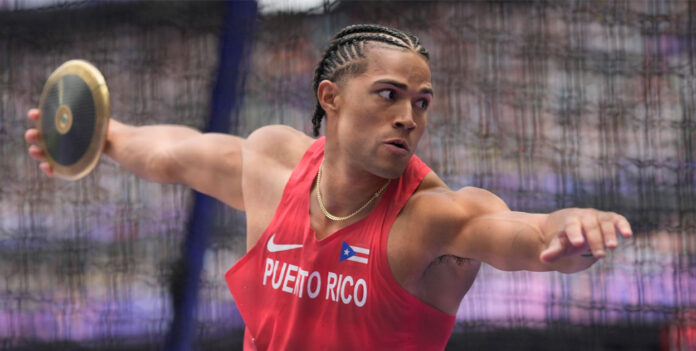
All Puerto Ricans have a story about how the average American – including fellow Americans of Latin American and Caribbean descent – remain misinformed about the colonial status of Puerto Rico.
In the case of Puerto Rico’s participation in the Olympic Games, a simple social media search will show how confused and misinformed so many people are of Puerto Rico and its national identity. Some will wonder why Puerto Ricans are not “eligible” for Team USA Olympic competition (not true; we are). Others don’t think the current Puerto Rican Men’s and Women’s National Basketball Team – both of whose rosters had many Puerto Ricans who were raised in the United States – were some sort of illegitimate roster of “fake” Boricuas. If Puerto Rico “should be” or “want to be” a U.S. state, how could they have an Olympics team?
Let me explain why Puerto Rico absolutely deserves and should always have participation in all international competition, including the Olympics – and how becoming a U.S. state would end Puerto Rico’s participation.
For decades, Puerto Ricans and the average American have not been given straight talk about the cold reality of Puerto Rico’s colonial reality. Before I was born and through most of my life, it was polite or proper to label Puerto Rico a “Commonwealth,” un “Estado Libre Asociado” or a “territory.” Until recently, using the correct word “colony” to describe the relationship between the overseer United States and the archipelago of Puerto Rico was like using a profanity in church. Now, even pro-statehood party advocates begrudgingly use the “c-word.” Indeed, “colony” is the correct word. Since the days of the Taino losing ground to Spanish conquistadors and the U.S. military invading Guánica, Puerto Rico in 1898 — it has always been the right word to describe the situation. The United States owns Puerto Rico by law.
Despite this colonial status, Puerto Rican sports and administrative leadership have tenuously maintained Puerto Rico’s development in international athletic competition. If you read “The Sovereign Colony” by Antonio Sotomayor, you will learn Puerto Rico first sent a delegation to Cuba and Central America in the 1930s, then sent its first Olympic team to the 1948 London Games. In an act of defiance, the London Games flag bearer Miguel Barasorda insisted carrying the Puerto Rican flag instead of a Spanish colonial-era code of arms in the opening ceremonies. Since then, Puerto Rican athletes have represented Puerto Rico in every Summer Olympics since (except for the 1980 Summer Olympics in Moscow – because the United States boycotted and prevented Puerto Rico from taking part).
In addition, due to the mix of birthright U.S. citizenship and sports sovereignty, Puerto Ricans are eligible for either the United States or Puerto Rican Olympic Team. Island-born athletes such as the late Jose “Chequi” Torres (boxing) and Gigi Fernandez (tennis) have won medals for Team USA. Athletes of Puerto Rican heritage like Laurie Hernandez (gymnastics) and Carmelo Anthony (basketball) have worn the Stars and Stripes as well. Island-born Boricuas like Monica Puig (tennis) and U.S.-born Puerto Ricans like Jasmine Camacho-Quinn (track and field) have won medals for Puerto Rico. Just as Philadelphia 76ers star Joel Embiid earned the right to choose between playing for Team USA and his native Cameroon in the Olympics, those of Puerto Rican heritage rightfully have the same choice.
To those who find it contradictory that statehood is considered by some Puerto Ricans yet the archipelago participates at the Olympics – you have a point. Too many pro-statehood advocates flat out lie or fail to realize that if Puerto Rico becomes the 51st State, no, Puerto Rico cannot have their Olympics cake and eat it too. Despite unfounded or weak arguments to the contrary, the United States has never allowed a U.S. state – say, Texas or Hawaii – to take part in the Olympics separate from Team USA. Some point to the Amateur Sports Act passed by President Jimmy Carter in 1978 as legal proof a state cannot participate separately in Olympic competition; some statehood advocates argue the revision of this act in 1998 could pave the way for Puerto Rico to be grandfathered in to maintain an Olympic team. Regardless, the reality is on your television or smart phones right now. Do you see a delegation from “the Lonestar State of Texas” in Paris? Does the state of Hawaii have a surfer wearing their state’s name on his or her chest? No. A U.S. state has never had its own Olympic team and realistically never will.
To see how Puerto Rico can maintain and grow its international sports participation, look no further than its own history and the struggles of independent nations and small sovereign entities like Ireland, Jamaica, the Dominican Republic, South Sudan and others in Paris right now. For pro-statehood advocates to be honest with their fellow Puerto Ricans, they will inevitably have to admit this celebration of Puerto Rican excellence and pride would all end under their preferred political status.
Michael Collazo is CEO of Dahday, LLC and a member of Philly Boricuas. You can follow him on X (formerly Twitter) @mcollazo215.






